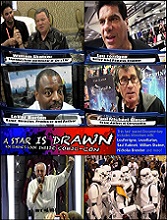It’s been widely noted that in his blog entry last Saturday, Peretz made the latest in a long string of bigoted statements about Muslims (for copious previous documentation of some of his utterings, see Greenwald here and here).
Of course, Peretz is entitled to his opinion, but then again, so are people who disagree with him. And that fact, it is clear, Peretz finds truly dismaying. Peretz’ latest outburst was prompted by a New York Times editorial expressing dismay about anti-Muslim sentiments. Apparently, expressing anti-Muslim hatred is legitimate, but characterizing such sentiments negatively, using words like “bias,” is just elitist, or an example of unwarranted “high dudgeon.”
While Peretz derides the Times for its supposed snobbery and mocks its “Olympian wisdom,” he certainly seems to think that he knows better than they do about all manner of topics. For example, Peretz questions polling data that shows a lower percentage of New Yorkers are hostile to Islam than Peretz believes there to be (and believes, clearly, than there ought to be). Why? Not because of any contradictory data or any valid concerns about the polling methodology? No, the reason Peretz doesn’t trust the Times‘ data is that, well, he just knows better, because unless people are being cowed into silence or are otherwise ignorant, how could it be otherwise?
Peretz’ entry, aside from the lines that have garnered all the attention, is really a fevered swamp of incoherence. He actually asserts that there have been no “serious” demonstrations against Islam in the United States. How he distinguishes serious demonstrations from the presumably humorous efforts around the country is never made clear. But more noteworthy than this dubious assertion is Peretz’ seeming lament that there is much more open hostility to Muslims in Europe than there is here. In Peretz’ understanding, the lack of anti-Muslim agitation here, compared with Europe, is a consequence of the fact that “Americans are so fearful of being accused of bias, however the injustice of the charge might be.” It follows that, absent that unfair and menacing charge of bias, we’d be heaping scorn and vituperation on Muslims as openly as Europeans do. Which, one can infer, Peretz thinks would be a good thing.
And Peretz asserts bizarrely that “Liberal political theory has virtually ignored the philosophical, legal and ethical questions posed by the threatening demographics of Europe. Is not western society, imperfect as it may be but immensely more liberal than the domains of Islam, obliged to defend its own…and their future.” I don’t know who it is that he imagines has not taken up this question, but he certainly cannot be referring to any college level modern political theory class offered in the past several decades, or any work on immigration, or any of the thousands of articles on the anti-immigrant right in Europe or the French banning of Islamic head scarves or really any of countless public discussions and debates on these issues in the past generation. Perhaps Peretz thinks that, if these debates don’t assume the straightforwardly bigoted stance that he clearly believes is the correct one, they may as well not have existed.
As I observed in discussing Dr. Laura’s recent rant, it’s become a staple of an increasingly openly bigoted movement in America to insist on their right to bigotry while simultaneously expressing outrage at anyone who actually calls them on it. Their thin-skinnedness is of a piece with their blindness to their own hypocritical invocations of political correctness as an epithet directed at their opponents. They can say whatever they want, however obnoxious, insensitive and hateful, but God forbid someone uses harsh language to describe their attitudes. What an affront that is!
And speaking of projecting onto your opponents that which you yourself are guilty of, how about the constant howling from bigots like Peretz about “elitists?” Peretz – so ready to take umbrage, to snivel about elitism when someone simply names his views what they so plainly are – has apparently missed the elitism that is at the core of his own worldview. People don’t express to pollsters a level of animosity toward Muslims that the wise Marty Peretz deems appropriate? They’re either lying, because they’re afraid to tell the truth, or they’re misguided in their benighted liberalism.
But Peretz’ elitist snobbery exists at a more fundamental level than that. If you describe a large group of people (in this case, over a billion strong), in toto, as inferior to you- well, isn’t that about as direct an assertion of elitism as there is? If you really believe that an entire ethnic or religious group (or whatever combination thereof you find disagreeable) is, in some fundamental way, inferior to you, you may think your beliefs are justified. But please stop whining about how elitist it is for people to call you on your assertions about that group’s rank inferiority.
Jonathan Weiler’s most recent book, Authoritarianism and Polarization in American Politics, co-authored with Marc Hetherington, was published last year by Cambridge University Press.
Read more: Marty Peretz, Islam, Elitism, Bigotry, Islamophobia, Anti-Muslim, Free Speech, Public Opinion, New York Times, Muslim, Europe Muslims, Politics News






